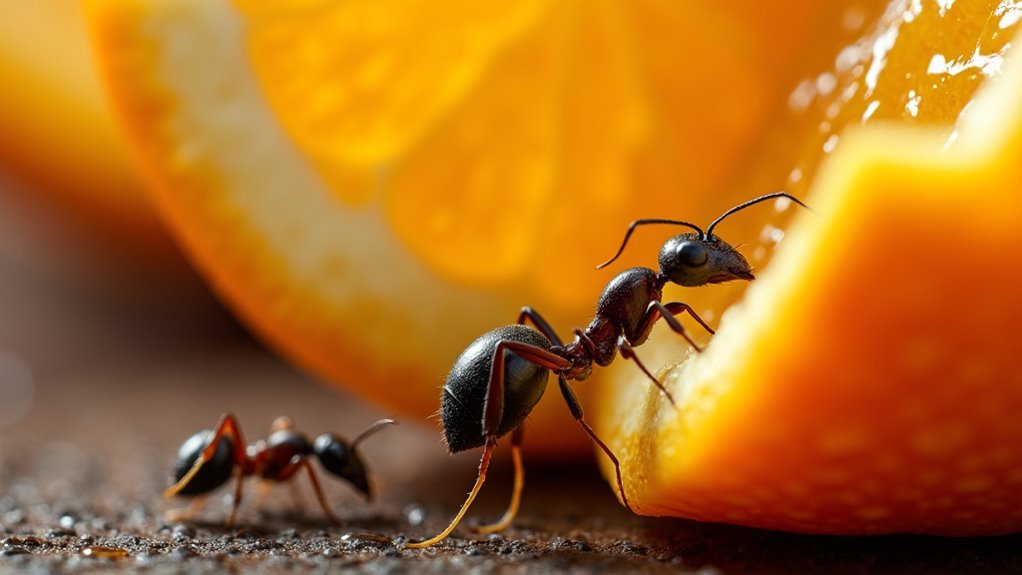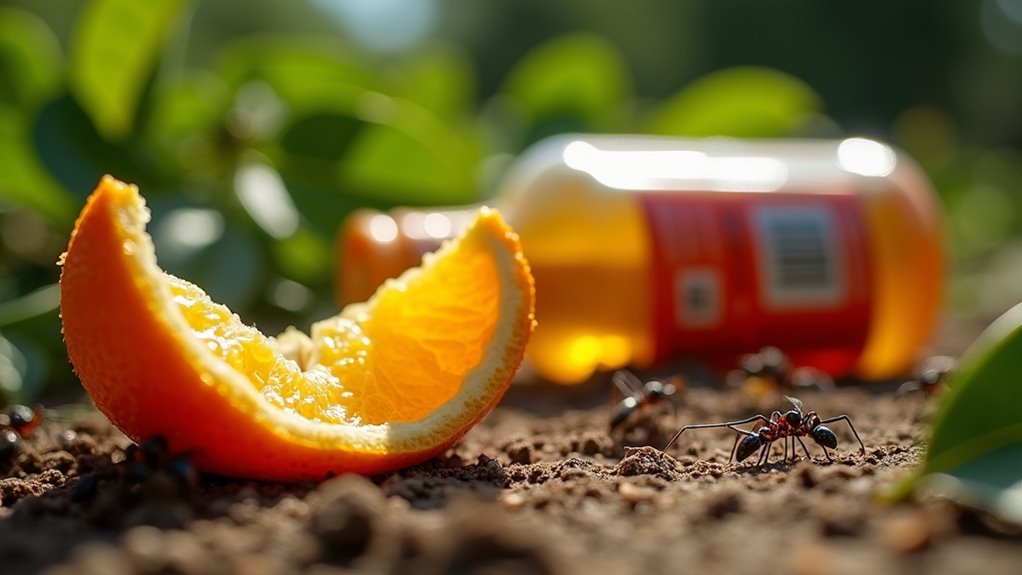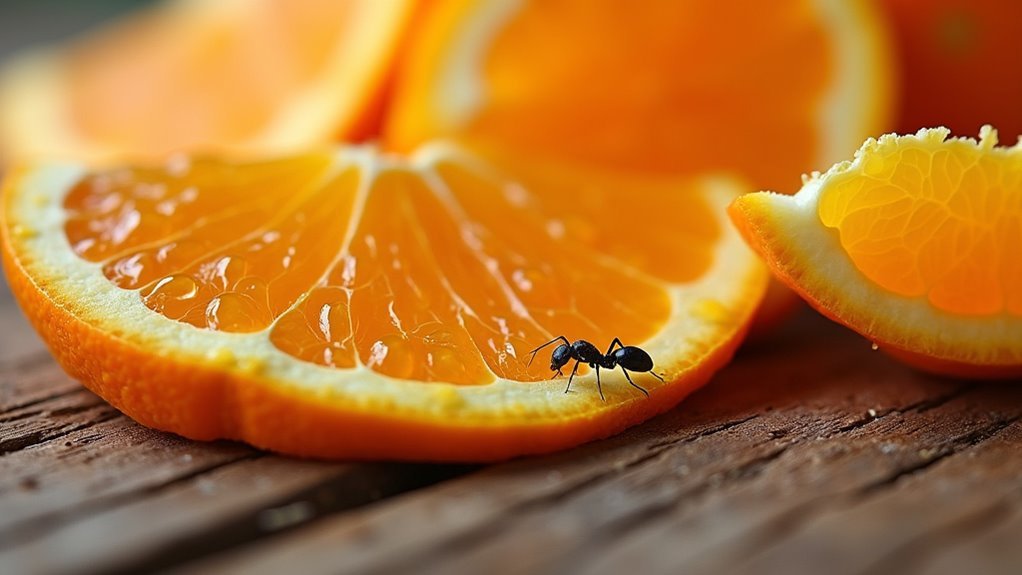Orange peels scare ants away because they’re packed with d-limonene, a natural compound that disrupts ants’ waxy protective coating and suffocates them by breaking down their respiratory function. This citrus oil doesn’t just kill ants—it also scrambles their pheromone trails, creating confusion that blinds them to food sources and breaks down their organized foraging behavior. You’ll discover the most effective application methods and why this natural solution outperforms commercial alternatives.
The Science Behind D-Limonene and Ant Deterrence

The secret weapon hiding in your orange peels is D-limonene, a powerful natural compound that attacks ants’ respiratory systems by disrupting their protective waxy coating.
D-limonene in orange peels disrupts ants’ waxy protective coating, attacking their respiratory systems with this powerful natural compound.
When you expose ants to this citrus-derived chemical, it fundamentally suffocates them by breaking down their ability to breathe properly.
You’ll find D-limonene works as both a killer and repellent – its strong citrus scent masks food odors that normally draw ants to your kitchen or dining areas.
Commercial pest control manufacturers have recognized this compound’s effectiveness, incorporating it into various products.
When you apply orange peels or D-limonene solutions regularly, you’re creating a natural ant barrier that’s both toxic to existing pests and preventative against future invasions.
How Orange Peels Disrupt Ant Scent Trails
When you place orange peels around your home, the D-limonene they contain masks the food aromas that normally attract ants to your kitchen and dining areas.
This powerful chemical doesn’t just cover up scents—it actively interferes with the pheromone trails ants use to communicate with their colony members.
You’re basically scrambling their GPS system, breaking down the communication pathways that allow them to coordinate their foraging efforts and navigate back to food sources.
D-Limonene Masks Food Aromas
Although ants possess remarkably sensitive olfactory systems that guide them to food sources, D-limonene in orange peels acts as a powerful disruptor to their scent-based navigation.
When you place orange peels near ant-prone areas, the citrus compound creates an invisible barrier that masks food aromas completely. Ants can’t detect the sweet, greasy, or protein-rich scents they’re naturally drawn to because D-limonene overwhelms their olfactory receptors.
This masking effect fundamentally blinds ants to nearby food sources, forcing them to search elsewhere. You’ll notice fewer ants appearing around kitchen counters, pet food bowls, or pantry areas when orange peels are strategically positioned.
The compound’s potent citrus scent overpowers even the most enticing food aromas, making your space invisible to foraging ants.
Chemical Interference With Pheromones
Beyond masking food scents, D-limonene creates havoc with ants’ sophisticated communication network by directly interfering with their pheromone trails.
When you place orange peels in areas where ants travel, the compound disrupts the chemical signals they depend on for navigation and coordination.
Ants leave invisible pheromone trails to guide their colony members to food sources and back to the nest.
D-limonene scrambles these vital messages, fundamentally jamming their communication system.
This interference causes confusion and disorientation among the ants, making them unable to follow established routes or relay important information to their nestmates.
The result is a breakdown in their organized foraging behavior.
Without reliable pheromone trails, ants lose their efficiency and become reluctant to venture into citrus-treated areas.
Disrupted Communication Pathways
Since ants depend entirely on chemical highways to navigate their world, orange peels create chaos by severing these invisible connections. When you place orange peels around your home, the D-limonene they release masks the scent trails ants use for navigation.
These chemical pathways guide worker ants from their colony to food sources and back again. Without these trails, ants become lost and can’t communicate effectively with their nestmates.
You’ll notice confused ants wandering aimlessly when their communication system fails. They can’t relay information about food locations or alert others to threats.
This natural disruption makes orange peels an effective solution for your ant problem, as colonies struggle to maintain organized foraging operations when their essential communication network breaks down.
Creating Homemade Orange Peel Ant Barriers
Creating an effective orange peel ant barrier requires just a few simple ingredients you likely have in your kitchen.
Using orange peels as home remedies offers an eco-friendly solution that’ll kill ants naturally through D-limonene exposure.
Essential Steps for Orange Peel Barriers:
- Blend equal parts orange peels and water into a thick paste
- Place mixture in small, recessed dishes near ant entry points
- Position barriers strategically around food sources and access routes
- Reapply fresh paste every 72 hours to maintain potency
- Replace with fresh peels when the citrus scent weakens
You’ll force ants to cross the deterrent paste, effectively blocking their access for at least three days.
The D-limonene destroys their waxy respiratory coating, creating a natural barrier that’s both effective and environmentally safe.
Proper Application Methods for Maximum Effectiveness

While orange peel barriers provide excellent ant control, you’ll achieve maximum effectiveness by applying them strategically rather than randomly scattering peels around your home.
Focus placement in areas where you’ve observed ant activity, as the orange oil disrupts their established scent trails. Grind or chop peels into smaller pieces to maximize surface area and enhance D-limonene release for stronger repellent effects.
Create targeted solutions by blending equal parts orange peels and water into a paste, then place this mixture in small dishes near ant foraging zones.
Position dried peels around entry points to establish a natural deterrent zone. Remember to refresh your barriers every few days since the citrus scent diminishes over time, reducing their ability to repel ants effectively.
Comparing Orange Peels to Other Citrus Fruits
While orange peels stand out as the top choice for ant deterrence, you’ll find that other citrus fruits also pack a punch against these unwanted visitors.
Lemon peels contain D-limonene too, but they’re less potent than oranges and need more frequent replacement to maintain their effectiveness.
Grapefruit peels work similarly to oranges with comparable D-limonene levels, though their bitter scent makes them less pleasant for indoor use compared to the sweeter orange alternative.
Lemon Peel Effectiveness
Although orange peels get most of the attention for ant control, lemon peels pack an equally powerful punch against these unwanted invaders.
Like their orange counterparts, lemon peels contain D-limonene, which acts as a natural repellent that disrupts ant scent trails effectively. The enhanced acidity in lemon peels actually makes them a stronger alternative for deterring ants naturally.
You’ll find these citrus options work interchangeably since they share similar active compounds that ants naturally avoid:
- D-limonene content disrupts communication pathways
- Higher acidity levels increase repellent strength
- Strong citrus scent creates unpleasant environment
- Readily available household waste material
- Cost-effective natural pest control solution
Both peels release scents that encourage ants to seek alternative routes, giving you flexible options for natural pest management.
Grapefruit Versus Orange
When choosing between orange and grapefruit peels for ant control, orange peels consistently outperform their larger citrus cousins.
While both contain D-limonene, orange peels pack considerably higher concentrations of this natural ant deterrent. You’ll find that grapefruit peels do repel ants through their citrus scent, but they’re simply less potent than orange peels.
The distinct aroma from orange peels more effectively masks food scents that attract ants to your home.
Grapefruit peels serve a similar purpose but aren’t as appealing to homeowners seeking reliable results. That’s why you’ll see orange peels dominating DIY pest control methods—they’re not only more readily available but also deliver superior repellent properties.
Their higher limonene content makes them more effective at disrupting ants’ scent trails.
D-Limonene Concentration Levels
D-limonene concentration levels explain exactly why orange peels dominate the citrus pest control hierarchy.
When you’re choosing natural ant repellents, you’ll find orange peels contain an impressive 90-95% D-limonene concentration, making them unmatched among citrus options. This compound disrupts ants’ respiratory systems, creating an effective barrier around your home.
Here’s how citrus fruits compare for ant control:
- Orange peels: 90-95% D-limonene concentration (most potent)
- Lemon peels: 40-50% D-limonene concentration (moderately effective)
- Grapefruit peels: 30-40% D-limonene concentration (least effective)
- Higher concentrations mean stronger respiratory disruption in ants.
- Orange peels outperform all other citrus alternatives by significant margins.
You’ll get maximum results using orange peels since they’re nearly twice as potent as lemons and three times stronger than grapefruits.
Making Orange Oil Spray for Targeted Treatment
Since ants rely heavily on scent trails to navigate and communicate, creating a targeted orange oil spray can effectively disrupt these pathways while providing a concentrated dose of D-limonene where you need it most.
You’ll need equal parts pulverized orange peels and water. For enhanced potency, heat the peels before blending to release more D-limonene. Blend thoroughly, then strain the mixture to create a smooth solution.
| Step | Action |
|---|---|
| 1 | Heat orange peels (optional) |
| 2 | Blend equal parts peels and water |
| 3 | Strain mixture for smoothness |
| 4 | Transfer to spray bottle |
Apply directly to surfaces where you’ve spotted ants. The spray disrupts their scent trails instantly. Reapply regularly, especially after rain or cleaning, to maintain the deterrent effect and keep ants away from treated areas.
Why Commercial Ant Killers Are Less Effective

While orange peels offer a natural solution, commercial ant killers often fall short of their promises. You’ll find that these products frequently disappoint homeowners who expect quick, lasting results.
Many commercial formulations simply don’t address the root causes of ant infestations, leading to recurring problems that drain your wallet and patience.
Here’s why commercial ant killers struggle to deliver:
- Species-specific limitations – Most products can’t effectively target all ant species in your home
- Slow-acting ingredients – Borax-based baits take time to work, allowing continued ant activity
- Resistance development – Ants adapt to repeated chemical exposure, reducing product effectiveness
- Surface-level treatment – They don’t eliminate food sources or seal entry points
- Health concerns – Chemical toxicity risks push homeowners toward safer alternatives
Orange peels address these shortcomings naturally and effectively.
Environmental Benefits of Natural Pest Control
When you choose orange peels over commercial ant killers, you’re breaking free from chemical dependency that harms local ecosystems and wildlife.
You’ll transform what would’ve been food waste into an effective pest deterrent, creating a sustainable cycle that benefits the environment.
This simple switch means you’re protecting beneficial insects and pollinators while keeping toxic substances away from your family and pets.
Reduced Chemical Dependency
Although synthetic pesticides promise quick results, they often create more problems than they solve by harming beneficial insects and contaminating local ecosystems.
When you choose orange peels over chemical alternatives, you’re breaking free from this destructive cycle. You’ll protect pollinators like bees and butterflies that your garden desperately needs while maintaining effective ant control through D-limonene’s natural repellent properties.
By reducing your chemical dependency, you’re also safeguarding water sources from harmful pesticide runoff that threatens both wildlife and human health.
- Orange peels contain D-limonene, a powerful natural insect repellent
- Chemical pesticides kill beneficial insects alongside targeted pests
- Pesticide runoff contaminates groundwater and nearby water sources
- Natural methods support biodiversity in your garden ecosystem
- Compostable orange peels reduce waste while providing pest control
Sustainable Waste Utilization
Every time you toss orange peels into your compost bin after using them for ant control, you’re completing a perfect circle of sustainability.
Instead of sending citrus waste to landfills, you’re transforming kitchen scraps into effective pest deterrents, then into nutrient-rich soil amendments.
This approach exemplifies circular economy principles in your household.
You’re extracting maximum value from what would otherwise be waste while avoiding single-use pesticide containers that contribute to plastic pollution.
Orange peels naturally decompose, unlike synthetic pest control products that persist in the environment.
Common Mistakes When Using Orange Peels Against Ants
While orange peels can effectively repel ants, many homeowners make critical errors that sabotage their success.
You’re likely undermining your efforts if you’re not placing peels where ants actually travel. Random placement won’t work—you need strategic positioning along ant trails and entry points.
Using dried-out peels is another mistake since they’ve lost the D-limonene that repels ants. Fresh peels pack the strongest punch.
Fresh orange peels contain potent D-limonene that effectively repels ants, while dried peels lose their active compounds and become useless.
Don’t expect orange peels to work magic if you’re leaving food crumbs everywhere. Clean up spills first, then deploy your citrus arsenal.
Common mistakes include:
- Placing peels in random locations instead of ant pathways
- Using old, dried peels with diminished D-limonene content
- Ignoring food cleanup while expecting peels to work alone
- Applying once and forgetting about regular replacement
- Skipping complementary prevention like sealed food containers
Additional Natural Remedies That Work With Orange Peels
When you combine orange peels with other natural remedies, you’ll create a more robust defense system against ant invasions.
You can use other citrus peels from lemons and grapefruits, which also contain D-limonene for enhanced deterrent effects.
Mix red pepper spray made from chopped chili peppers and water with your orange peels for stronger repellent properties.
Create garlic spray by pureeing garlic with vegetable oil and water to complement orange peels.
Combine neem oil with orange oil for a powerful organic pest control solution targeting multiple insects.
Mix vinegar with orange peels to disrupt ant scent trails, amplifying the citrus deterrent effects.
These combinations maximize your natural pest control arsenal.
Frequently Asked Questions
Do Orange Peels Keep Ants Away?
Yes, you’ll find orange peels effectively repel ants. They contain D-limonene, which disrupts ants’ respiratory systems. You can place peels around affected areas to mask food scents and create natural barriers that deter these pests.
Why Should You Place Orange Peels Around Your Patio?
You should place orange peels around your patio because they’ll create an effective barrier that deters ants and other pests while masking food scents that attract them to your outdoor space.
What Smell Do Ants Absolutely Hate?
You’ll find that ants absolutely hate citrus smells, especially from orange peels. The D-limonene chemical disrupts their scent trails and overwhelms their sensitive olfactory systems, making them avoid treated areas completely.
Why Put Orange Peels in the Garden?
You’ll benefit from orange peels’ dual purpose in your garden. They naturally repel ants through D-limonene’s strong citrus scent while enriching your soil as they decompose, creating healthier plants without chemical pesticides.
In Summary
You’ve discovered that orange peels naturally repel ants through d-limonene, disrupting their scent trails and creating effective barriers. You’ll find this eco-friendly method outperforms harsh chemicals while protecting your family and environment. Don’t make common mistakes like using old peels or inadequate coverage. You can combine orange peels with other natural remedies for enhanced results. You’re now equipped to keep ants away using this simple, sustainable solution that’s been hiding in your kitchen.





Leave a Reply